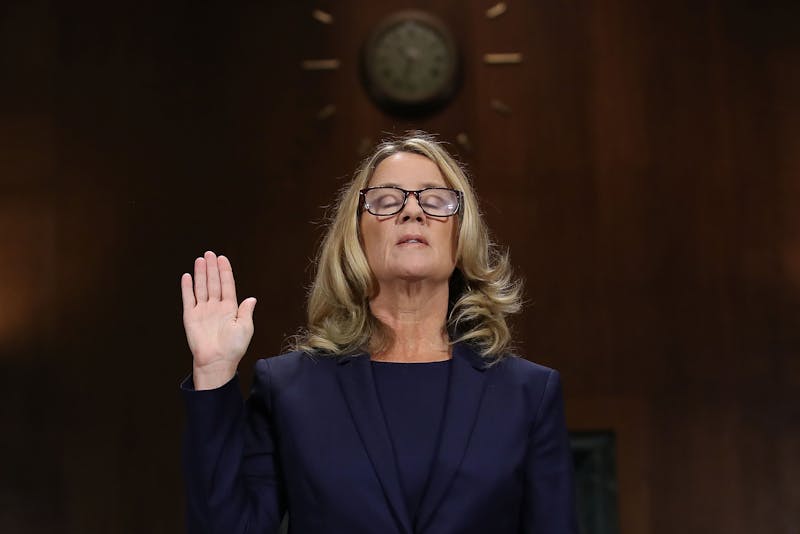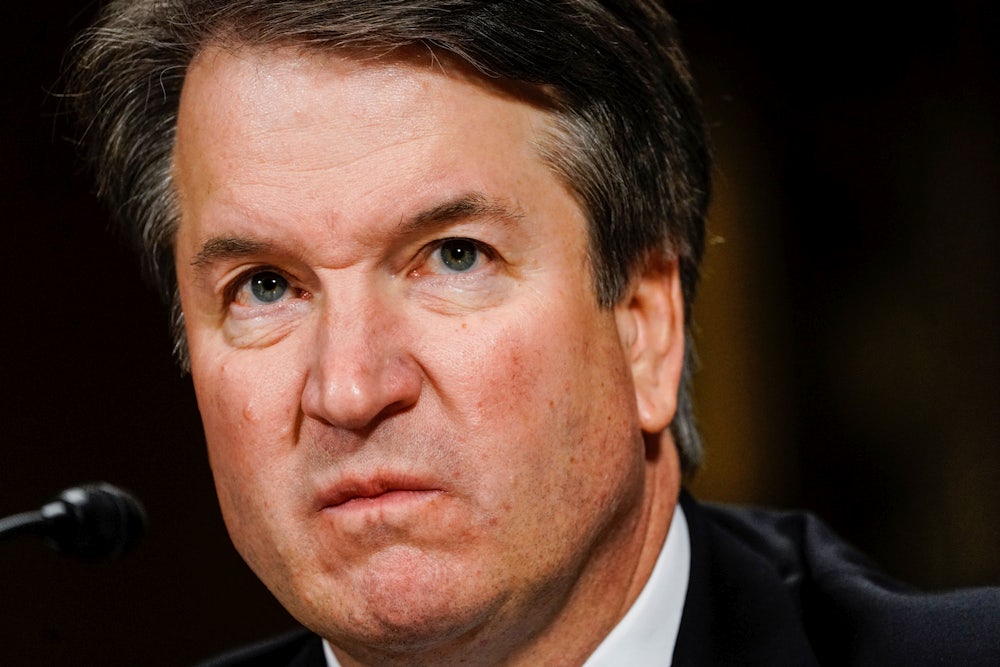There is a photo of Christine Blasey Ford from her Thursday appearance before the Senate Judiciary Committee that captures why her testimony about Brett Kavanaugh—the Supreme Court nominee she has accused of sexually assaulting her in the summer of 1982, when they were both teenagers—felt true. She is raising her hand as the oath is administered. Her eyes are closed and she is taking a deep breath, as if bracing herself not only for the pain of reliving a horrible personal trauma on national television, but also for the possibility that, no matter what she says and no matter how convincingly she says it, she will not be believed, that it is all for naught, that Kavanaugh will be confirmed anyway. In that moment, she has so little to gain, so much to lose.
By the end of the day, those fears appeared to be coming true. Though observers across the ideological spectrum found her testimony to be achingly credible, it was little match for the machinery of partisan politics. Republican senators lined up to say they were voting for Kavanaugh’s nomination. The conservative press went into rhapsodies over his wild, angry, tearful testimony, which they took as compelling evidence of his sincerity, even as liberals dismissed it as surreal Trumpian bombast. Few were putting much faith in a handful of Republican fence-sitters—Lisa Murkowski, Susan Collins, Jeff Flake—to stem the grinding momentum in Kavanaugh’s favor. His nomination goes to a committee vote on Friday.
This spectacle was, in many ways, the ultimate test of the #MeToo movement and its exhortation to “believe women.” Though other women have accused Kavanaugh of bad behavior, they were not called as witnesses. Though another man—Mark Judge—was allegedly present when Kavanaugh allegedly attempted to rape Ford, he was also not present, turning the hearing into a he-said/she-said affair. And at stake was not just the job of a high-powered man, but a lifetime appointment to the Supreme Court, which provides powerful incentives for certain politicians to not believe the woman.
But it would be inaccurate to say, if Kavanaugh is confirmed, that Ford was thwarted by naked partisan interests alone. The most sinister part of yesterday’s hearing was the sight of Republicans insisting they did believe she had been assaulted, just not by Kavanaugh. (As Kavanaugh himself put it, “I’m not questioning that Dr. Ford may have been sexually assaulted by some person in some place at some time.”) One of the central premises of the #MeToo movement had been accepted and absorbed, but in such a way that its impact was neutered. Indeed, the saga of Kavanaugh saw the appropriation of several #MeToo tropes in the service of defending the accused, muddying the distinction between victim and perpetrator, the powerful and the powerless.

There would otherwise seem to be few similarities between their respective testimonies. Ford delivered an instantly seminal account of sexual abuse and its lifelong effects, and on the biggest possible stage. As many women noted, she mustered the kinds of wiles that are typical of women in patriarchal settings (all eleven Republicans on the committee are white men). She showed her interrogators all due deference: “Does that work for you?” she said at one point. “I’m used to being collegial.” As a psychologist, she bolstered her account with expert testimony on the way trauma affects memory, illuminating a neurological cross-section of pain: “Indelible in the hippocampus is the laughter,” Ford said, her voice breaking. “The uproarious laughter between the two. They’re having fun at my expense.”
Kavanaugh, in contrast, launched a slashing, unprecedented attack on the Democratic members of the committee, accusing them of replacing “‘advice and consent’ with ‘search and destroy.’” He gave full vent to his outrage, saying his reputation had been dragged through the mud. Borrowing from Donald Trump (who heartily approved of his performance), he blamed the Clintons and their supporters for orchestrating a vast left-wing conspiracy against his nomination. He frequently dissolved into tears, on topics ranging from his daughters to his after-school weight-lifting sessions in high school. And above all, he denied, denied, denied.
For this viewer (and the perspective of the individual viewer is all-important in this polarized matter), it was a case of a person protesting too much. There were times when he stumbled, such as when Senator Dick Durbin asked whether he personally would want the FBI to investigate Ford’s accusation—for a moment, Kavanaugh seemed stunned into silence. There were little lies and deceptions strewn throughout his testimony, such as his innocent definitions of “boof” and “devil’s triangle.” And there was nothing substantial to exonerate him—certainly not his now-infamous calendar, which may in fact contain clues that point to his guilt.
His testimony was, overall, one of the most disturbing things to have happened in this presidency. It suggested, at the very least, that Republicans should find another candidate—one who is not so prone to explosive rage, for starters—to nominate to the Supreme Court. But to conservative viewers, Kavanaugh’s performance had virtually the same effect that Ford’s testimony had on liberal viewers. They praised him for showing his raw emotions. They admired his pluck in the face of hostile media coverage. They said, enough is enough. As David French wrote in National Review:
Today, there were conservatives across the nation who choked up—some openly wept—during his testimony. Not because they disrespect women. Not because they excuse sexual assault. But because they also love their sons. Because they are tired of being painted as evil when they are seeking to do what’s right. Because they want to see a man fight with honor.
This mirroring of Kavanaugh and Ford is no happenstance. It cannot simply be chalked up to the partisan prism through which all reality in this country is refracted. No, that conservatives were weeping over Kavanaugh’s testimony suggests that he pulled some of the same emotional triggers that have animated the #MeToo movement. If Ford has suffered her whole life from that one night in 1982, then so will Kavanaugh: He stated that “my family and my name have been totally and permanently destroyed by vicious and false additional accusations.” (Emphasis added.) If women’s rage is finally acceptable, well then so is Kavanaugh’s; as Rich Lowry, also of National Review, wrote, Kavanaugh “showed the nation a powerfully human reaction to the attacks on him.” And if we must believe women—and all the Republicans seemed to agree that we must believe Ford suffered some kind of abuse—then we must believe men, too.
This confluence of Kavanaugh and Ford’s storylines found its clearest manifestation in an operatic performance by Senator Lindsey Graham, who told Kavanaugh, “She’s as much of a victim as you are.” By then the #MeToo-ization of Brett Kavanaugh was complete, not only giving Republicans the runway to vote for him, but also reinforcing a theme of conservative politics that gained prominence with Donald Trump’s campaign for president: that the real victims in this country are white men.
